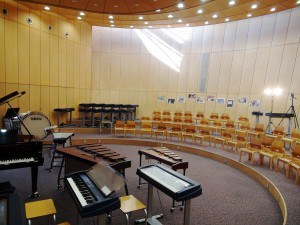
Anxiety is a common companion for music advocates, parents, teachers, and even students at the end of every budget cycle as they wait to find out whether their favorite programs have been cut. Cutting music programs has become commonplace in many of the public schools of the developed world.
They always seem to be the first to go, even though given the choice, most people would keep music in the school curriculum. Unfortunately for most of us, we have little if any influence in the decision, so there’s a general feeling of powerlessness in stopping the cuts.
However, what can’t be denied is that ultimately, cutting music from the curriculum is wrong and denies students a vital resource that would benefit them at every stage of their lives and not just in the classroom. So why is it that the cuts continue despite the fact that we all generally appreciate what a musical education has to offer?
Tony Mazzochi offers what he believes are the four main reasons why music is cut from school continuously and offers his solutions for each:
1. Our school leaders are not innovative
Despite the fact that we are living in the fast-paced 21st century, the education system model that was build in the 19th century remains operational despite the fact that it has become outdated and irrelevant. Back them, academic ability and the glorification of the sciences and math over the arts was the order of the day. Unfortunately, this does not seem to have changed.

The age of hyper-standardized testing will soon come to a halt, and there will be a push for more arts instruction in schools. Until that day, we all need to continue to remind school leaders that if they are going to push for innovation in school curricula, they need to put their trust into the arts to fulfill that mission. Via Music Parents Guide
2. The value systems in schools are outdated
Most administrators will readily admit that music is important, but many of them don’t actually believe that the school curriculum would be lacking if music was excluded. Those who should be leading the education reform to lay more emphasis on the arts are inadequately armed.
We have decided that our school system should be a prolonged process of university entrance, and that is what dominates Board of Ed discussions for hours. Meanwhile, most of our children are highly talented, brilliant, creative people who think they’re not, because the thing they are good at school isn’t valued. We can’t afford to go this way, and it is time we insist our school leaders and legislators stop throwing around words like “innovative” and “creative” and instead begin to model that behavior themselves; through creative scheduling and a divorce from standardizing our kids in order to measure their growth. Via Music Parents Guide
3. Existing music programs are underperforming

Subjects like math and English cannot be cut, so it doesn’t matter whether the teachers are effective or not. However, the arts face the challenge of proving themselves to justify their inclusion in the curriculum. The effects of a failed music program will also be easy to notice – students will quit.
As huge a music advocate as I am, I believe that a bad music program is worse than no music program. There is nothing worse than the bad taste a poor musical experience leaves in everyone’s mouths — administrators’, teachers’, parents’ and students. Keeping a music program alive and well in a school requires a great teacher who builds a community around the program, thereby making it very difficult to cut. Via Music Parents Guide
4. Myopic approach to budget constraints
Music classes tend to have higher student-teacher ratios, and cutting them will trigger the need for elective classes with low student-teacher ratios that will be more costly. In other words, while cutting music programs may be seen as a quick fix for budget issues, it actually has negative financial implications.
Basically, a cut to an instrumental music teacher may result in two or more teachers needing to be hired later to provide elective classes with low student-teacher ratios. The cuts end up being short-sighted — and bringing back a music program once it is cut is very rare and incredibly difficult to do. Via Music Parents Guide
In conclusion, here’s what Mazzocchi suggests:
Cutting music instruction will negatively affect the creativity of our next generation’s leaders, so now is the time for parents to be arts advocates– not only in our schools, but in our communities and in the press as well. Parents should be aware of local and federal timing issues, such as when school budgets are planned and when elections take place. They should always feel free to contact the media in thoughtful response to budget cuts to the arts and follow up with timely letters to administrators with thoughts and concerns. Via Music Parents Guide
Featured Image: Image Credit
Join us in helping to power the next generation of rock stars: https://t.co/dYiOGIb9dB#Rock4Kidspic.twitter.com/WPFQpQWOWu
— Salesforce (@salesforce) January 18, 2016
Related Articles:
‘Cutting arts and music programs is worth the savings’: Sarcastic new #SaidNoSchoolEver ad campaign
There’s a new ad campaign that is sarcastic but funny and reflects something real: many public schools and teachers don’t nearly enough resources.
#SaidNoSchoolEver is being promoted by Hefty, the trash bag company, and the Havas Worldwide Chicago ad agency, with 30-second spots in which teachers say things such as:
“I love spending my own money on supplies”
“Cutting arts and music programs is worth the savings”
“This map — from 1913. Almost all of the states are there.”
“More funding for schools? Nah, we’re good.” Via Washington Post
Why cut music programs that help children with their learning?
In the past few years, the state of Maine has been struggling to sustain music programs in schools. Some superintendents and school boards cut music programs because some schools have weak programs, along with a lack of support from parents, which makes music an easy target, especially when budgets are tight.
Unfortunately, much of society is unaware of just how beneficial music is to every student in the program, both socially and developmentally. According to Becky Mallory, the Reeds Brook Middle School music director in Hampden, she has witnessed that the involvement in music has been very strong as long as she can even remember, not just for the musically gifted children, but for those on the edge of dropping out of school or getting into the wrong crowd. Via Bangor Daily
School Art Programs: Should They Be Saved?
Art education can benefit students in different ways, including improving student performance across the whole curriculum. But art programs in schools are often the first to be cut, if budget cuts are necessary. As a result, many students are missing out on the benefits of art classes. So, is it important to provide art education in schools? Read on to learn about art programs’ benefits and the issues with funding them for public school students.
Art education in public schools usually includes any combination of dance, music, drama/theatre, and visual arts classes. It’s usually funded by the federal, state, and local governments, but not all schools provide their students with art education. Via Law Street Media

